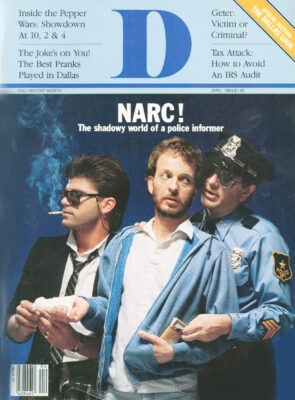Most people have lived in Dallas County long enough to understand the quirkiness of the relationships between the four men who are on the Republican ticket for the Dallas County sheriffs seat in the May 5 primary.
But there are many newcomers to the area who may not understand who the candidates are or know about the long and controversial history of the sheriff’s office.
Take the incumbent candidate, Sheriff Don Byrd, for example. He led a pristine career in the Dallas Police Department that peaked when he was named chief of police in 1973. That image endured even after he entered partisan politics to run for the office of sheriff in 1979. He defeated the controversial and outspoken Sheriff Carl Thomas (the second candidate) with the claim that he could restore efficiency, morale and integrity to the office. Thomas left dejectedly to pursue careers in acting and real estate. He currently owns a private security company.
It’s unlikely that any of the candidates would have run for sheriff if Byrd’s reputation hadn’t come under serious fire last year when he was indicted-and later acquitted-on charges of drunk driving in University Park. Byrd, his confidence still shaken, says that deciding to run for a second term was the toughest decision he’s ever made.
Enter Thomas again. He says that he would have run for sheriff whether Byrd had announced his candidacy or not. Thomas, like the other candidates, argues that the department has the same problems today that it did when he left office in 1979: inefficiency in the county jail, a backlog of un-served warrants, low deputy morale and other problems inherent in managing the mammoth law-enforcement agency.
The other candidates-Jim Bowles, Bob Collins and Byrd-say they were curious as to why Thomas decided to run again, since they believe the controversies that marred his term are still in the public’s mind. Who could forget the day he arrested a Dallas Morning News reporter for refusing to leave the sheriffs waiting room, or the FBI investigation into his haphazard style of hiring and firing employees?
Despite the flamboyance of his administration, most observers agree that Thomas cut back on the number of warrants, improved conditions at the county jail and created a narcotics task force.
Now, consider Bowles and Collins. Thomas knows it’s too early in the race to discount these two as competition. Bowles practically grew up with Byrd. They went through the Navy and the Dallas Police Academy together. When Byrd became sheriff, Bowles went from the Police Department to the county office as an assistant chief deputy, where, he says, he was responsible for the civil service program and the deputy merit pay plan. People close to Byrd say the two had a falling-out when Bowles resigned in January 1983, but Bowles says that he was just ready to retire. He’s hoping that voters will view him as the “non-controversial candidate.”
Collins, interestingly enough, once worked for Thomas as director of detentions and director of judicial operations. He says he is the only one who knows how to manage the warrant backlog and how to run the Lew Sterrett Justice Center. The irony is that Collins ran against Byrd and Thomas in the 1979 sheriff’s race-on the Democratic ticket. Collins says that an attorney advised him to run as a Democrat so that if he lost the election, he could keep his job. The plan failed.
Collins was later called in by the Commissioners’ Court during Byrd’s administration to act as a consultant during the completion of the Justice Center, Collins says that at the time he worked mostly with Bowles, who, as assistant chief deputy, acted as a liaison.
As election day draws near, the cordial debates between these four rivals are likely to turn into heated criticism spurred by their past antagonisms.
Get our weekly recap
Brings new meaning to the phrase Sunday Funday. No spam, ever.
Related Articles

Arts & Entertainment
DIFF Documentary City of Hate Reframes JFK’s Assassination Alongside Modern Dallas
Documentarian Quin Mathews revisited the topic in the wake of a number of tragedies that shared North Texas as their center.
By Austin Zook

Business
How Plug and Play in Frisco and McKinney Is Connecting DFW to a Global Innovation Circuit
The global innovation platform headquartered in Silicon Valley has launched accelerator programs in North Texas focused on sports tech, fintech and AI.

Arts & Entertainment
‘The Trouble is You Think You Have Time’: Paul Levatino on Bastards of Soul
A Q&A with the music-industry veteran and first-time feature director about his new documentary and the loss of a friend.
By Zac Crain


